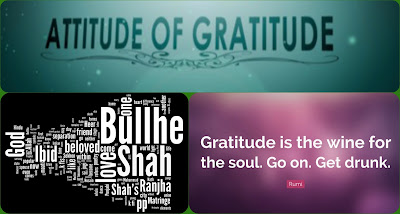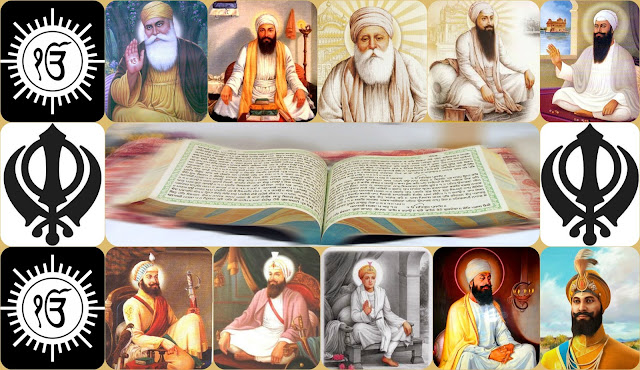AOG : Easiest way for a Contented Happy Life
On a lazy Sunday while scrolling through the social media feed my attention plunged upon a satirical verse of greatest Sufi mystic poet of the Punjab, Mir Bulleh Shah Qadiri Shatari, on gratitude and thanking the Almighty…
“Charde sooraj dhalde vekhe, Bujhde Deeve balde vekhe,
Heere da koi mull na taare, Khote sikke chalde vekhe,
Jinna da na jag te koi, O vi puttar palde vekhe,
Ohdi rehmat de naal bande, Paani utte turde vekhe,
Loki kehnde daal ni galdi, Mai te pathar galde vekhe,
Jinna kadar na kitti rab di bulleya, Hath khaali o malde vekhe,
Kai pairan toh nange firde, seer te labhde chanva,
Mainu daata sab kuch ditta, kyunna main shukar manava.”
Gratitude means thankfulness, counting your blessings, noticing simple pleasures, and acknowledging everything that you receive.
"Attitude of Gratitude (AOG)" is really essential for living a contented and happy life. AOG really helps put into perspective the power and importance of being thankful more of the time and not just on one particular day out of the year.
So please consider with me some of the contrasts between a grateful and an ungrateful heart:
- A grateful person is humble, while ingratitude reveals pride
The grateful person feels a great sense of unworthiness: "I have so much more than I deserve."
An ungrateful person has a proud heart, and ingratitude reveals a proud heart. You see, an ungrateful person feels, "I deserve so much more than I have." He forgets that he is a debtor, that he owes everything he has to God.
Every hint of ingratitude is an indicator of pride in our life.
- Grateful people are Loving, giving, whereas ungrateful people are demanding.
Grateful people who are God-centered and others-centered are loving people who want to bless others. But ungrateful people, because they are self-centered, are bent on, "What will please me? How can I be satisfied?" So grateful people are God-centered and God-conscious, others-centered and others-conscious; but ungrateful people are self-centered and self-conscious people.
Ungrateful people, as a result, typically are demanding people. But grateful people are free to be giving and caring because they are centered on God, and they are centered on others, not on themselves.
Ungrateful people, as a result, typically are demanding people. But grateful people are free to be giving and caring because they are centered on God, and they are centered on others, not on themselves.
An unthankful person is full of himself, and his whole world revolves around himself. He seldom pauses to consider the needs and feelings of others. He is selfish.
- A grateful heart is a full heart, while an unthankful heart is an empty one.
No matter how little any one may actually have compared with others, a grateful person enjoys a sense of fullness. But no matter how much a person may in fact have, if he is not a thankful person, he will live with a gnawing sense of emptiness. Imagine an unthankful heart with a hole in it that causes all its blessings to leak out.
The grateful person has unlimited capacity to truly enjoy God’s blessings, while the ungrateful person can’t enjoy the blessings he does have.
- A grateful person is easily contented, while an ungrateful person is subject to bitterness and discontent.
Our happiness in life lies in gratitude, the path to prosperity in life, to love in life is in gratitude. No matter how hard we try if we do not have an attitude of gratitude, we cannot be great.
We have often heard that it is easier to remember to be devotional when we are in pain. We then seek relief in prayer and meditation and find our way back to our spiritual essence. Remembering to be grateful while we are suffering is the fast track out of pain and suffering.
When we focus our attention on our blessings, it shifts the energy around us, and our auras change to allow more positive things to flow through. It shows us how blessed we are and shifts our focus from anger, fear and lack to gratitude, courage, and abundance.
Prosperity flows in that state of grace, it flows easily, without stress, worry, or frustration, or any emotions that drain our life force. When we are grateful, we are naturally filled with kindness and compassion.
- A grateful heart will be expressed by thankful words, while an ungrateful heart will manifest itself in complaining.
A grateful spirit is what enables people to view and respond to the most painful circumstances in life with thanksgiving.
As one person observed, "Some people complain because God put thorns on roses, while others praise Him for putting roses among thorns."
We are either whining or worshiping. Our natural, sinful state makes us prone to see what we lack, what we don’t have, and what’s gone wrong in our lives.Complaining is often our default response.
We are either whining or worshiping. Our natural, sinful state makes us prone to see what we lack, what we don’t have, and what’s gone wrong in our lives.Complaining is often our default response.
When things don’t go your way, remember that every difficulty carries within it the seeds of an equal or greater benefit.
If something bad happens to you during the day, your happiness can drop momentarily, but then it returns to its natural set-point. Likewise, if something positive happens to you, your level of happiness rises, and then it returns once again to your "happiness set-point".
- Conclusion :
A practice of gratitude raises your "happiness set-point" so you can remain at a higher level of happiness regardless of outside circumstances. Once you become oriented toward looking for things to be grateful for, you will find that you begin to appreciate simple pleasures and things that you previously took for granted.
Gratitude should not be just a reaction to getting what you want, but an all-the-time gratitude, the kind where you notice the little things and where you constantly look for the good even in unpleasant situations.
Gratitude shifts your focus from what your life lacks to the abundance that is already present. People tend to take for granted the good that is already present in their lives.
Today, start bringing gratitude to your experiences, instead of waiting for a positive experience in order to feel grateful.
"To say we feel grateful is not to say that everything in our lives is necessarily great. It just means we are aware of our blessings."
"Look at everything as though you were seeing it for the first or the last time, then your time on earth will be filled with glory." -- Betty Smith
The "AOG" is something that desperately needs to be cultivated in our hearts, our homes, and our society. Its presence brings a host of other blessings, while its absence has profound, lethal repercussions.
When you thank God in advance for that which you choose to experience in your reality, you, in effect, acknowledge that it is there…in effect. Thankfulness is thus the most powerful statement to God; an affirmation that even before you ask, I have answered. Therefore never supplicate. Appreciate.
When you thank God in advance for that which you choose to experience in your reality, you, in effect, acknowledge that it is there…in effect. Thankfulness is thus the most powerful statement to God; an affirmation that even before you ask, I have answered. Therefore never supplicate. Appreciate.
"The correct prayer is therefore never a prayer of supplication, but a prayer of gratitude."
Source : Forbes Magazine





